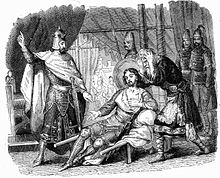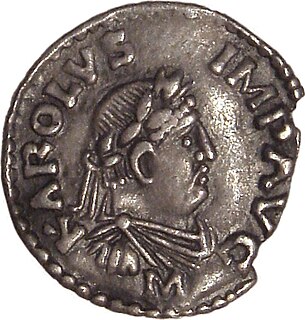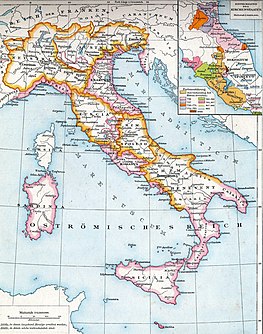
The Lombards or Longobards were a Germanic people who ruled most of the Italian Peninsula from 568 to 774.
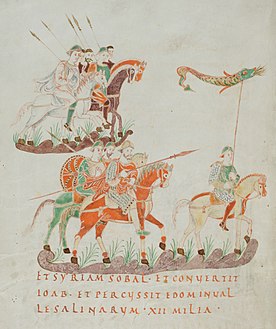
The Siege or Battle of Pavia was fought in 773–774 in northern Italy, near Ticinum, and resulted in the victory of the Franks under Charlemagne against the Lombards under king Desiderius.

The history of the Italian peninsula during the medieval period can be roughly defined as the time between the collapse of the Western Roman Empire and the Italian Renaissance.

The Duchy of Benevento was the southernmost Lombard duchy in the Italian peninsula, centered on Benevento, a city in Southern Italy. Being cut off from the rest of the Lombard possessions by the papal Duchy of Rome, Benevento was practically independent from the start. Only during the reigns of Grimoald I of Benevento and the kings from Liutprand on was the duchy closely tied to the kingdom. After the fall of the kingdom, however, alone of Lombard territories it remained as a rump state, and maintained its de facto independence for nearly three hundred years, though it was divided after 849.

Adalgis or Adelchis was an associate king of the Lombards from August 759, reigning with his father, Desiderius, until their deposition in June 774. His mother was Ansa. He is remembered today primarily as the hero of the play Adelchi (1822) by Alessandro Manzoni.

The Deutsches Theater in Berlin is a well-known German theatre. It was built in 1850 as Friedrich-Wilhelm-Städtisches Theater, after Frederick William IV of Prussia. Located on Schumann Street (Schumannstraße), the Deutsches Theater consists of two adjoining stages that share a common, classical facade. The main stage was built in 1850, originally for operettas.

Grimoald III was the Lombard Prince of Benevento from 788 until his own death. He was the second son of Arechis II and Adelperga. In 787, he and his elder brother Romoald were sent as hostages to Charlemagne who had descended the Italian peninsula as far as Salerno to receive the submission of Benevento. In return for peace, Arechis recognised Charlemagne's suzerainty and handed Grimoald over as a hostage.
Yoruba literature is the spoken and written literature of the Yoruba people, one of the largest ethno-linguistic groups in Nigeria and in the rest of Africa. The Yorùbá language is spoken in Nigeria, Benin, and Togo, as well as in dispersed Yoruba communities throughout the world.

Adelchis was the son of Radelchis I, Prince of Benevento, and successor of his brother Radelgar in 854.
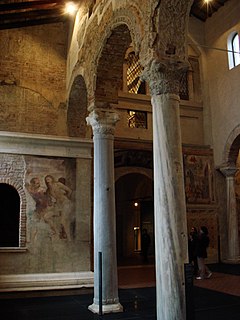
Ansa or Ansia belonged to an aristocratic family of Brescia and was the wife of Desiderius (756-774), King of the Lombards. The Latin name does not imply a Romano-Italic origin, as Romans and Lombards in the eighth century tended to take either German or Latin names. She was probably a Lombard, the daughter of Verissimo and sister of King Hildeprand, Arechis, and Donnolo, and niece of King Liutprand.
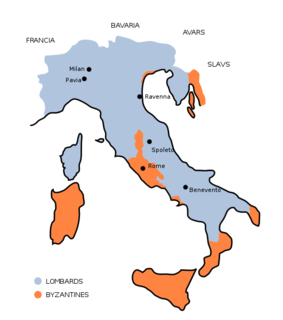
The Kingdom of the Lombards also known as the Lombard Kingdom; later the Kingdom of (all) Italy, was an early medieval state established by the Lombards, a Germanic people, on the Italian Peninsula in the latter part of the 6th century. The king was traditionally elected by the highest-ranking aristocrats, the dukes, as several attempts to establish a hereditary dynasty failed. The kingdom was subdivided into a varying number of duchies, ruled by semi-autonomous dukes, which were in turn subdivided into gastaldates at the municipal level. The capital of the kingdom and the center of its political life was Pavia in the modern northern Italian region of Lombardy.
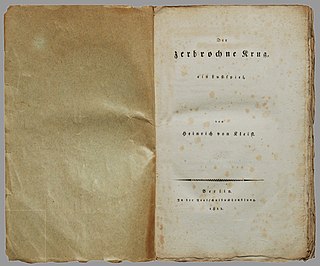
The Broken Jug is a comedy written by the German playwright Heinrich von Kleist. Kleist first conceived the idea for the play in 1801, upon looking at a copper engraving in Heinrich Zschokke's house entitled "Le juge, ou la cruche cassée." In 1803, challenged over his ability to write comedy, Kleist dictated the first three scenes of the play, though it was not completed until 1806. Johann Wolfgang von Goethe first staged the play in Weimar, where it premiered on 2 March 1808.

Vsevolod Vitalievich Vishnevsky was a Soviet dramatist and prose writer.

Drama is the specific mode of fiction represented in performance: a play, opera, mime, ballet, etc, performed in a theatre, or on radio or television. Considered as a genre of poetry in general, the dramatic mode has been contrasted with the epic and the lyrical modes ever since Aristotle's Poetics —the earliest work of dramatic theory.
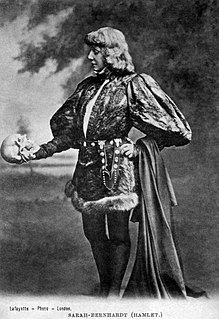
Theatre or theater is a collaborative form of fine art that uses live performers, typically actors or actresses, to present the experience of a real or imagined event before a live audience in a specific place, often a stage. The performers may communicate this experience to the audience through combinations of gesture, speech, song, music, and dance. Elements of art, such as painted scenery and stagecraft such as lighting are used to enhance the physicality, presence and immediacy of the experience. The specific place of the performance is also named by the word "theatre" as derived from the Ancient Greek θέατρον, itself from θεάομαι.
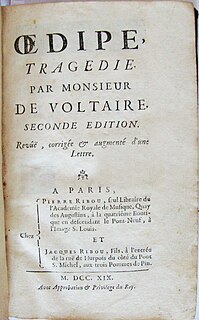
Oedipus is a tragedy by the French dramatist and philosopher Voltaire that was first performed in 1718. It was his first play and the first literary work for which he used the pen-name Voltaire.
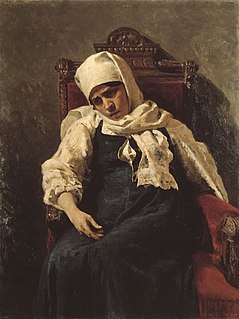
A Bitter Fate, also translated as A Bitter Lot, is an 1859 realistic play by Aleksey Pisemsky.
In film and television, drama is a genre of narrative fiction intended to be more serious than humorous in tone. Drama of this kind is usually qualified with additional terms that specify its particular subgenre, such as "police crime drama", "political drama", "legal drama", "historical period drama", "domestic drama", or "comedy-drama". These terms tend to indicate a particular setting or subject-matter, or else they qualify the otherwise serious tone of a drama with elements that encourage a broader range of moods.
Adelchis, also spelled Adelgis or Adalgis, is a masculine Germanic given name used among the Lombards. It may refer to:
